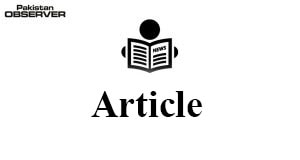PTSD in sexual assault survivors
BEING a literature person, I use to see everything as depicted through the lens of stories, novels, plays or poetry.
After getting a profound understanding of its function, I agree with the opinion of famous authors and researchers Amber Moore and Deborah Begoray who argue that “literature has powerful potential to express pain and can be used for healing”.
The latest novels that I have read include Music of What Happens (2019) by Bill Konigsberg, The Luckiest Girl (2015) by Jessica Knoll, and An Untamed State (2014) by Roxane Gay.
These novels are based on a vivid depiction of the severe traumatic experience of sexual assault survivors before and after the tragedies.
Unfortunately, the thematic connectivity of these novels with the happening of a tragic incident of sexual assault in Lahore on 14th August gave me the idea to write this article.
The unfortunate incident happened when TikToker Ayesha Akram was celebrating Independence Day with her group of friends at Lahore’s Greater Iqbal Park near Minar-e-Pakistan.
All of a sudden, she was attacked by an ever increasing mob of 400 men who harassed her sexually, and even tore her clothes while passing her around between each other. Lastly, they also snatched the girl’s jewelry, mobile phone, CNIC, and 15,000 cash.
Throughout my article I am determined to use the word survivor for Ayesha Akram because she maintained her strength amidst the most savage and brutal incident.
Monica Thompson in her research “Life after rape: A chance to speak?” opines that the term victim is perceived “negatively and ascribed characteristics such as being weak, powerless, vulnerable and still affected by the rape”, whilst a survivor had more positive connotations “such as strength, recovery and someone who was „over? the rape”.
Now, the above mentioned novels and real life incident with Ayesha Akram obviously ask us to strongly condemn such incidents to make this society a safer place. Yet there is another thing that we often miss, that is to move ahead wisely.
Unfortunately, she has faced the huge tragedy, and things can’t be undone but let us not lose the chance to minimize her pain.
We should help her pass through this phase smoothly and move on with her life. We should help her avoid Post-Traumatic Stress Disorder (PTSD) that is very common in sexual assault survivors.
PTSD is a mental health condition in which people experience a variety of symptoms after a person has been through a traumatic event, like death, fear, natural disaster, sudden loss or sexual assault.
The trauma of being assaulted can leave one feeling scared, angry, guilty, anxious, sad, embarrassed or ashamed.
It also cast adverse impact on relationships, and occupational functioning. PTSD is not a sign of weakness but a mental health condition that can be diagnosed and treated.
After an assault, survivors experience The Rape Trauma Syndrome (RTS), The Acute Phase occurs immediately following the assault when the survivor experiences a wide range of consists of emotional reactions such as shaking, crying or yelling.
The second phase is Outward Adjustment, when the survivor focuses less on the assault, often with a high level of denial, and involves themselves in normal daily activities.
The final phase is Long Term Reorganization, in which the survivor integrates the assault into their view of themselves and resolves their feelings about the assailant.
If the survivor of sexual assault believes that others have failed to react in a positive and supportive manner, there is a greater risk of PTSD?s consequences.
The alarmingly high rate of ever-present sexual assault in Pakistan is a strong indication that the government should develop effective treatment and intervention methods for survivors? quick cure.
In the present case, Ayesha Akram has made a bold and wise decision to come forward and share her story of sexual assault so that such evils should be penalized and curbed consequently.
But, generally, due to the lack of a supportive community, the assault survivors are not willing to disclose their experience.
Those who disclose often receive secondary victimization from medical, legal or healthcare professionals, who behave skeptic and exhibit victim-blaming behaviours.
The government should provide especially trained services to deal sexual assault traumatization, and more effective medications should be developed to treat and manage the biological aspects of this disorder.
The number of rape prevention centres and education programs should be developed to debunk rape myths, change victim-blaming attitudes and de-stigmatize the subject.
Education must inculcate these values in children as National Agency for Education in its report titled Curriculum for the Upper Secondary School states “The school must promote understanding of other people and the ability to empathize.
No one in school should be discriminated against on the grounds of sex, ethnicity, sexual orientation. … Xenophobia and intolerance must be met with knowledge, open discussion and active efforts”.
One of the most important aspects in assisting the recovery process is empowering the survivor and putting control back into their hands.
Physicians, therapists, law enforcement agencies and family and friends must work together to find the meaning of recovery from the perspective of the survivors and to understand what conditions will facilitate growth and recovery.
In this way, greater success in decreasing the rate of rape, sexual assault and PTSD associated with sexual assault may be achieved. Let’s hope the next Independence Day will be far better than this one.
—The writer is Assistant Professor English, University of Jhang, Punjab Pakistan.










